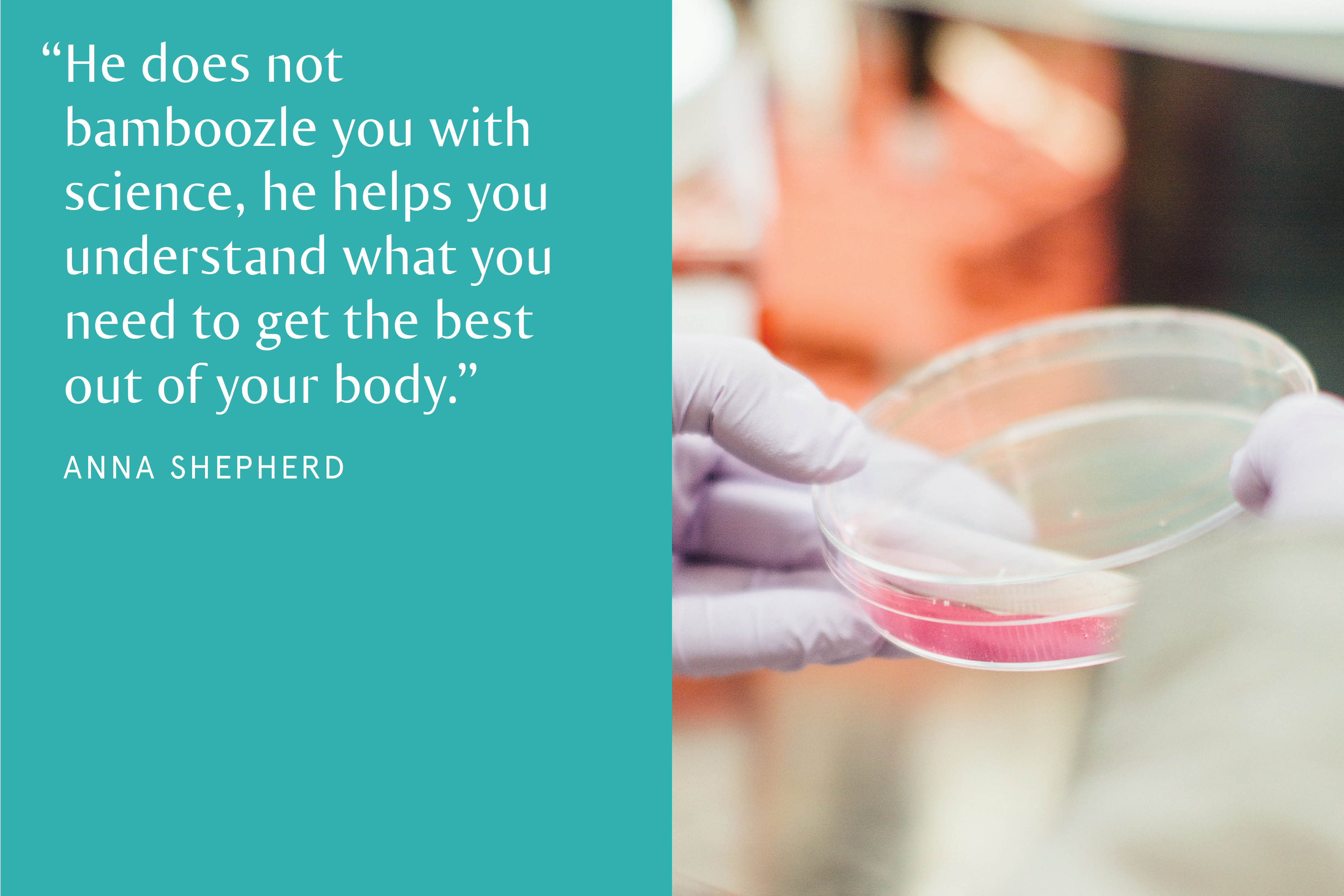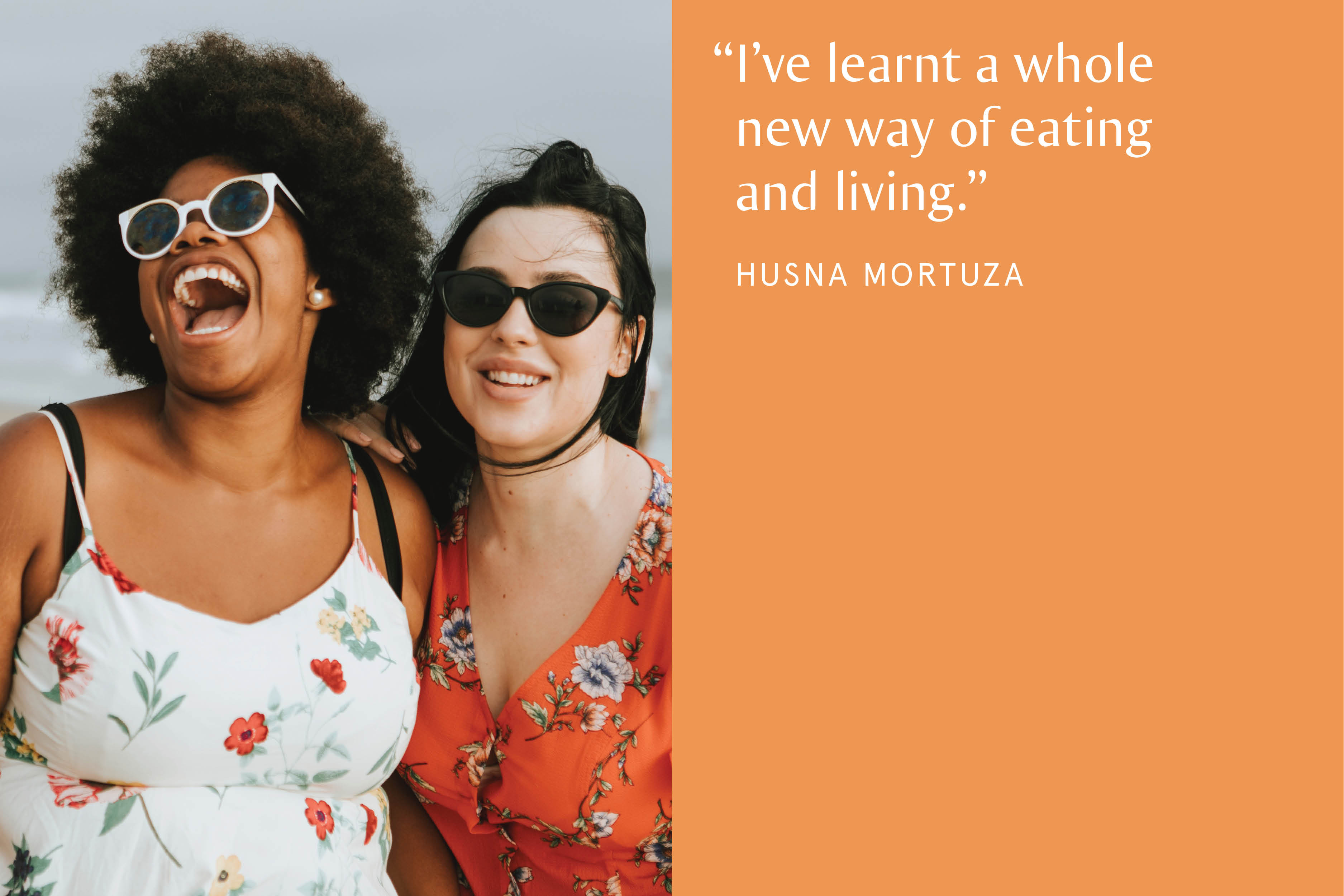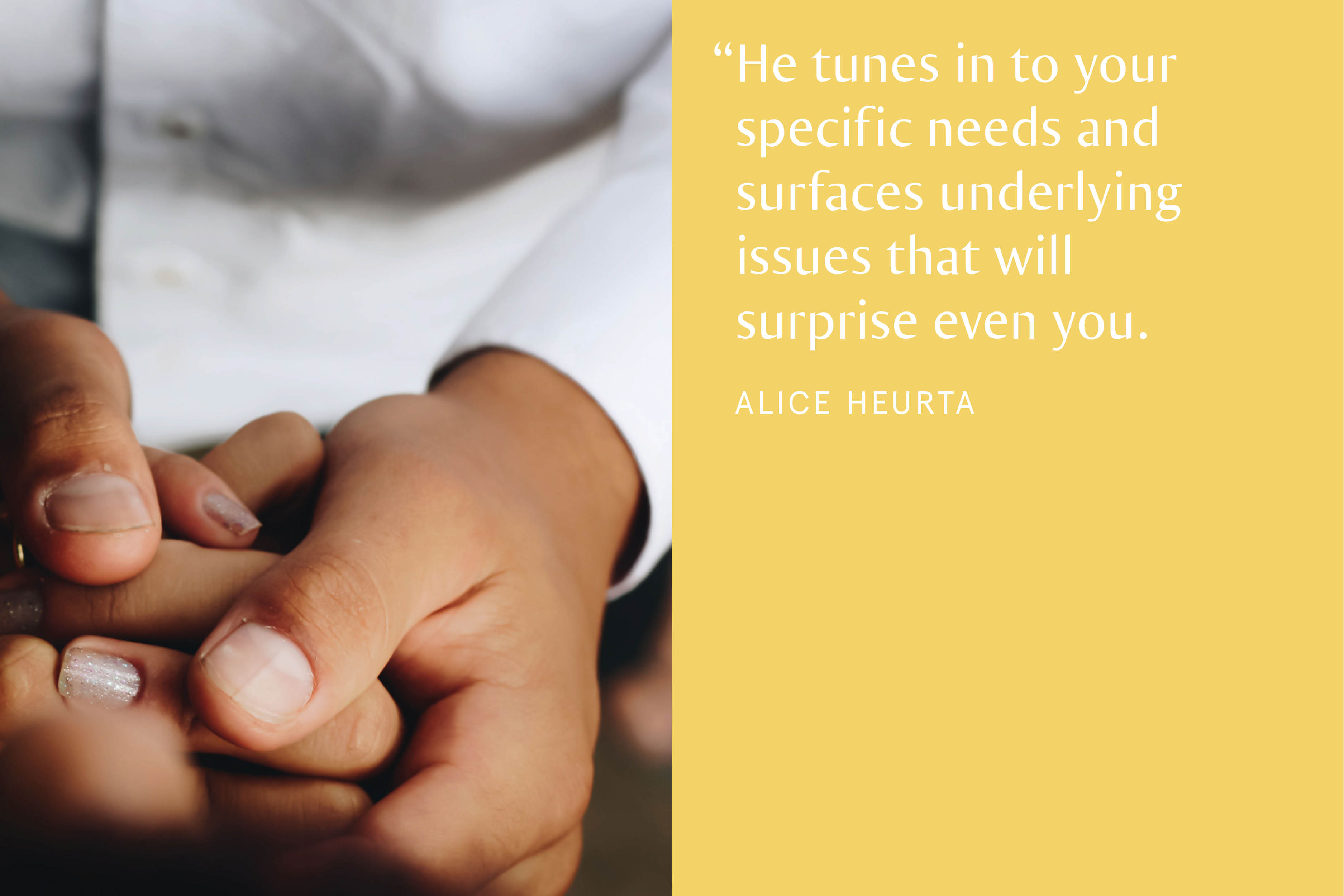Note: At time time, I’m not taking on any new 1-1 clients. To be the first notified when I re-open the doors to my program The Fundamentals Of Full Recovery, click here.
Want to know how to restore your health and fully recover…even if you’ve been living with an eating disorder for years or decades?
You already know of other people who have recovered and left their eating disorders behind for good: they’re living a meaningful life of health and freedom rather than being dictated by rules, fear and anxiety. And that’s what you want too, right?
If you’re like many of my clients, you want:
Symptoms to improve: you can sleep through the night; your bones are optimally protected; you’re no longer cold; your period has come back; you can digest a wide range of foods; your hair, skin and nails are strong and healthy; and you feel energised and embodied- Thoughts about eating have drifted into the background and you see food for what it is: just food
- To freely enjoy meals with friends or family and have
the ability to be spontaneous - To feel fully
equipped to deal with the inevitable uncertainty and challenges of life, as you now have an excellent toolbox of coping skills at your fingertips - To feel connected and sincerely
grateful for your body - To have the choice to move your body from a place of genuine joy
- To walk by a mirror and be happy to be the person looking back at you
But the problem is: you’ve tried everything.
My clients tell me about having tried many things, ranging from Weight Watchers, Jenny Craig, paleo, vegan, carnivore, MFP (My Fitness Pal), “clean eating” and keto to calorie counting and rigorous workout plans.
They’ve even tried in-patient and out-patient treatment; they’ve seen doctors, therapists, and practitioners.
They had such hope to find lasting relief and to achieve freedom finally — only to have it crushed time and time again.
“But it’s not as bad as it used to be…”
Even though true freedom still eludes you and many symptoms are still occurring, there are likely some improvements that have occurred.
You can reflect that it used to be even worse than this and that at least some things have moved in a positive direction. For example:
You feel less cold and your hands aren’t as blue in the winter compared to before
You’re able to eat certain foods you couldn’t previously consume. Or you can eat food in higher quantities than you could before
You‘re following a less rigid exercise routine. Maybe it’s now just walking instead of the other classes you used to do
You’ve stopped calorie counting, or at least aren’t using an app like you were before
You have an increased ability to concentrate and find you’re less irritable
It’s great that these improvements have occurred. It demonstrates that you can take action and make changes. It also shows that the body can heal when it is given the things that it needs.
But while these improvements should be celebrated, they can also be a trap. They can keep you focused on how bad things were in the past and how much better they are now. And this can lead to getting stuck in quasi recovery.

What the heck is quasi recovery?
Recovery is a process of healing.
There is physical healing that your body needs to go through to repair from the eating disorder.
There is the mental and emotional healing; changing your relationship to thoughts and feelings and discovering new beliefs.
And there is the healing of habits; learning to take action and prioritising practices that truly support your health and well-being.
As annoying as it is, this healing takes time. To move from a place where things were at their worst to reaching a place for full recovery.
Quasi recovery is partial recovery. Yes, things aren’t as bad as they were. But equally, you are far from being at your best.
As I mentioned earlier, part of the reason you get stuck in quasi recovery is that it’s too easy to compare the current situation to when things were worse. So in relative terms, things feel better.
But there are two other big reasons why you stay stuck:
#1 You believe that this is as good as it gets
When you’ve tried so many things that haven’t worked, it becomes natural to start to believe that full recovery isn’t possible.
“That’s something that happens for other people, but not me.”
Or you believe that no one truly recovers. And that everyone who says that have are deluded or lying.
Recovery takes effort and if you believe it’s not going to work, then why bother? Better to just accept the status quo and that this is your lot in life and to get used to it.
This belief is often compounded by the fact that in some or even many areas of life, things are feeling successful. Possibly you’ve got a good job, you have a partner, you have a great friend’s circle, and you travel.
Your work colleagues think of you as hardworking and smart. Your friends think of you as the “healthy one” or the “fit one.”
So, while you are aware that the eating disorder is impacting your life, this feels like a personal issue and one that you can (mostly) hide from the rest of the world.
And at the place you’re at, because you’ve become so accustomed to the symptoms and the restrictive way of living, the disorder is not stopping you from having a sort-of enjoyable life.
#2 Whenever you try to change, it causes anxiety, fear and overwhelm
I don’t need to tell you how hard recovery is, you already know this.
To have clawed yourself back from when things were even worse to get to the place you’re in now has been a monumental task.
Even your normal day-to-day is a challenge. To maintain the current way of eating and moving and simply surviving takes all the strength you can muster.
Just the thought of increasing your food intake, trying a “fear food” or reducing your movement causes a body-wide anxiety reaction.
Sure, if you had a magic wand that removed the painful thoughts and feelings, then you’d be open to making more changes. But with no magic wand shop in existence, this isn’t a realistic option.
You’ve heard so often that recovery is meant to lead to a better life. But if this is true, then this change shouldn’t be hard. You should make a change and instantly feel better. Or you should decide to change and feel no ambivalence, you just get on with it.
So this belief and the subsequent anxiety or worry that comes up any time you do try to change keeps you stuck.
Because the reality is, with whatever progress you have made, you’ve simply traded one prison cell for another. Sure, this cell is bigger than the last one: it has more room to move, and you have permission to do things you couldn’t do before. But you are still in prison.

The good news!
If this rings true for you, I completely understand why you feel like giving up. But please don’t. The truth is, it doesn’t have to be this way. There is a way forward to the future you’ve dreamed of: a future where eating is easy, movement is joyful, and your body feels like home.
Introducing a powerful methodology…
The Transformational Recovery Method ™
After working with clients for over 15 years I have identified the three areas that determine the success of recovery.
When recovery has stalled, or worse, a relapse is happening, it’s because of one (or at least one) of these areas. And when things are improving and there is an “upward spiral,” it’s also because of one (or at least one) of these areas.
In fact, everything that I work on with clients is focused on these three things.
What’s so helpful about the Transformational Recovery Method ™ is that it simplifies the process of recovery. Rather than feeling confused and overwhelmed, it now makes sense.
Now, this isn’t to say that recovery becomes “easy.” There will still be uncomfortable thoughts and feelings, changes to your physical body that you may not like and you’ll need to take action at times when you wish didn’t have to.
So I guide you through a process and framework that cuts through the complexity and the overwhelm and the “what if” thinking.
And the best part? This teaches you skills that will be applicable for the rest of your life. This isn’t just about “recovery,” it’s about creating a life that is in alignment with your values and having the resilience to deal with whatever arises.
Pain and uncertainty are givens in this life, so rather than trying to avoid these things (which is an impossibility) you’ll discover how to thrive even when these things are present.
Do you want these kinds of results?
Before “I’d been back and forth to doctors, tried every therapy, holistic treatment, and wellness tactic going, but I felt like crap, every day, mentally and physically. I was convinced there was something seriously wrong with me…”
After “Today is the first time since perhaps being a child that I am able to thrive internally and externally. Chris was the missing piece of the puzzle. Chris gave me the keys to my life and I’ll always be grateful.”
Before “Whenever I sought help in the past I felt “not sick enough,” probably because it‘s hard to recognise all the areas in your life that are being compromised by your disordered behaviours, when you’ve just gotten used to feeling mediocre all the time.”
After “Talking to Chris I became more aware of my values and what I want to achieve. Life is so so much better without having eating issues.”
Before “Despite working with a nutritionist and a therapist for more than a year, I was still firmly entrenched in the hellish prison of “quasi” recovery, unable to comprehend how I could completely walk away from what I believed to have been my identity for as long as I could remember. Nor could I imagine a way forward without it.”
After “I knew from the first few minutes of speaking with Chris that working with him was going to be the best investment I could make for myself and my future. I am eternally grateful to Chris for the gifts he has given me in our time together and know they will continue to illuminate my path ahead to a free and fulfilling future.”
Before “I had a lot of anxiety around my health, and I started to feel that I could only eat things that were very healthy for my body, otherwise, I would be putting myself at risk of all kinds of diseases. I had completely lost the connection that allowed me to listen to my body and what it needed.”
After “I’m not constantly worrying that my body isn’t getting what it needs. I now feel so differently about how I look, it’s not like the critical thoughts never cross my mind, but I am able to see them for what they are and let them go more easily, and realise that how I look isn’t what is most important to me, it’s how I feel.”
Before “I didn’t have my period, had just been diagnosed with osteoporosis, was underweight, and barely eating 1000 calories day. I was peeing about 5 times a night and was struggling with waking up and wanting to eat in the middle of the night. I hated being alive.”
After “I am starting to see that my body is capable of functioning normally. I feel like a teenager again. I am enjoying life, eating whatever I want, and having fun. Our work together has both saved my life and created an opportunity for me to truly live.”

Getting the support you need and deserve
I’ve helped countless clients to restore their health and end eating disorder behaviours so that they can regain their period, sleep through the night, improve body image and have a peaceful relationship with food and exercise.
Unlike other alternatives that focus on just one aspect of recovery I take a multi-pronged approach that teaches life-enhancing practices that are used well after the eating disorder is gone.
I believe that full recovery is possible. For everyone. And because of this belief and the desire to make it a reality, I give my full energy, attention and focus to each client I work with. This means my services are limited to a small number of people at any one time.
In fact, I will only take you on as a client if I am sure that our work together will lead to lasting results for you: an improvement in your health and symptoms, a peaceful relationship with food and your body, a life that’s in alignment with your values, and the ability to take action and be resilient in the face of challenges. In other words, results that will last for the rest of your life.
So, are YOU ready to fully recover?
To find out if we’re a good fit, I offer a free Recovery Strategy Call. This allows me to find out more about you and what’s going on and for me to explain the Transformational Recovery Method ™. Click on the link below to register, I’ll then be in contact with more details and how to book a time for the strategy call. I look forward to getting to know you and working together.
Note: At time time, I’m not taking on any new 1-1 clients. To be the first notified when I re-open the doors to my program The Fundamentals Of Full Recovery, click here.
